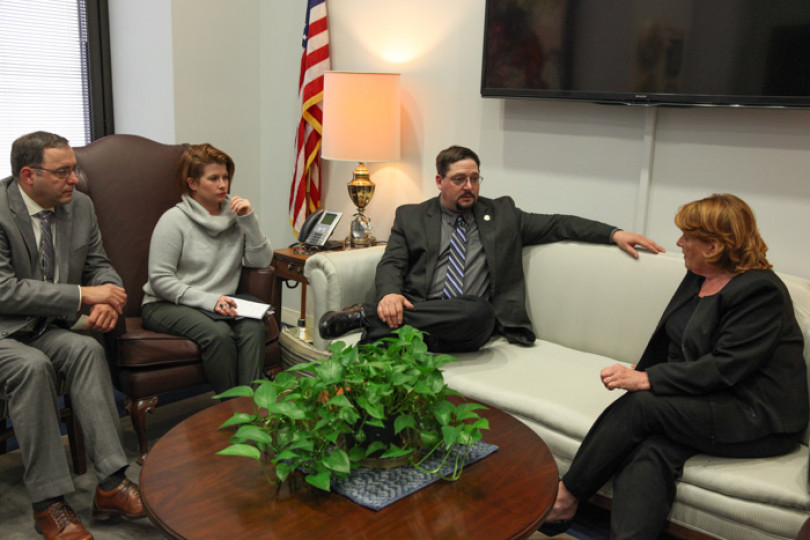Senator Heidi Heitkamp (D-ND), talks with L-674 delegates. Heitkamp, who championed the passage the FUTURE Act, received the Boilermakers’ 2018 Senate Legislator of the Year award.
View Photo Gallery (8 photos)
Boilermakers urge legislation to secure pensions, workplace rights
BRINGING THE BOILERMAKER voice to Washington, D.C., has been the key component of the annual LEAP conference since it first began 50 years ago. This year, more than 175 LEAP delegates trekked to Capitol Hill April 23-25 to meet with their respective representatives in the U.S. Senate and House of Representatives.
It’s something Boilermaker delegates prepare for throughout the year and during conference sessions, supported by the Boilermakers’ Department of Government Affairs. The DGA continually monitors, researches and engages with Congress, government agencies and coalitions on issues critical to the Boilermakers and labor in general. Top issues are summarized in LEAP fact sheets, and delegates arm themselves with this information as they set off to lobby on Capitol Hill.
For some, the dialog and debate with federal lawmakers is exhilarating. For others — especially those going to “the Hill” for the first time — it can jangle some nerves. But with little exception, most experience a thoughtful and mutually respectful conversation that ends with a Boilermaker call for action.
Key topics this year focused on five issues: pension and retirement security, energy policy, workforce protections, onerous health care taxes and the Jones Act. In addition to those broader national topics, most delegates also took the opportunity to address local and state issues.
Following are just a few highlights from 2018 Boilermaker legislator visits.
Sen. Heitkamp receptive to Local 647 issues
BOILERMAKERS FROM NORTH Dakota met with Senator Heidi Heitkamp (D-ND), the Boilermakers’ honoree for the Senate Legislator of the Year. Gathering in Heitkamp’s office, the delegation, led by Local 647 BM-ST Luke Voigt, expressed concern about the Trump “tax break” package that passed this year. “[For our members in the construction trade], we can’t write off expenses anymore,” Voigt said. “There needs to be a fix for seasonal workers like the Boilermakers and other trades.”
Heitkamp agreed. “It’s not just the unions, there are a lot of others who are impacted by this,” she said.
The group also discussed upcoming infrastructure legislation and its possible effect on the Davis-Bacon Act (a 1931 law that requires paying the local prevailing wage on public works projects). Heitkamp, who is up for reelection in 2018, said she would stand for workers in the event lawmakers try to repeal Davis-Bacon.
SE members talk energy policy, workplace security with Sen. Jones
MEMBERS OF LOCAL 455 (Sheffield, Alabama), Local 693 (Pascagoula, Mississippi), Local 108 (Birmingham, Alabama), Local D-23 (Clinchfield, Georgia) and International staff met jointly with newly elected Senator Doug Jones (D-AL). Jones, rushing in to meet with Boilermakers between back-to-back appointments, thanked them for their support in his recent special-election win over Republican Roy Moore.
Jones listened to delegates’ concerns about the WAGE Act (Workplace Action for a Growing Economy, a bill introduced in the House and Senate that strengthens the rights of workers and protects those seeking to form a union). Carlos Brooks, President of Local D23, said he sees a need to strengthen workplace protections.
“It’s really important,” said Brooks. “We need a tighter grip on the laws that are already in place and the passage of new legislation.”
Local 455 BM-ST Tres Howard talked with Jones about energy policy, top of mind because two Tennessee Valley Authority coal-fired plants recently shut down — the Colbert Fossil Plant and the Johnsonville Fossil Plant.
“We’re in support of cleaning up power plants and working on existing power plants,” said Howard.
The group also asked Jones to work toward further incentivizing carbon capture use and storage (CCUS) on new or existing coal plants by changing Section 48A (the investment tax credit for clean coal) to waive the efficiency requirement for eligible projects.
Boilermaker constituents visit PA congressmen
FRESHLY ELECTED REPRESENTATIVE Conor Lamb (D-PA 18th), welcomed BM-ST John Hughes, James Witner and Shawn Steffee from Local 154 (Pittsburgh) into his still-sparse office to talk about energy, continued support of carbon capture use and storage, the Jones Act and local issues.
It was also an opportunity for the Boilermakers to congratulate Lamb, who they supported in a special election — and for Lamb to offer his thanks to the Boilermakers.
“Our people are with you 100 percent,” Hughes told Lamb.
Also on the House side, Local 13 (Philadelphia) delegates met with Representative Brian Fitzpatrick (R-PA 8th). BM-ST Martin Williams and Sean Coleman focused their discussion on refineries and increased CCUS incentives, the Jones Act, and the Health Care Excise Tax (also known as the “Cadillac Tax”).
“Shipping needs to be protected,” Fitzpatrick said pointedly after Williams explained misinformation that fueled recent talk of repealing the Jones Act. Fitzpatrick and the Boilermakers discussed the financial motives behind those who would challenge the Jones Act.
“It comes up every now and then,” Williams said, reiterating how adversaries seized the chance to blast the act after Hurricane Maria wrought havoc on Puerto Rico. “Infrastructure was the issue [preventing supplies from immediately reaching Puerto Rico], not the Jones Act.”
Regarding the Cadillac Tax initiative, Fitzpatrick said he believed the issue would not gain traction. “There’s no reason it shouldn’t get repealed rather than delayed,” he said, referring to the potential tax’s current 2022 enactment timeline.
Local 374 packs in full day of lobbying
TO KICK OFF a packed meeting schedule, Local 374 (Hammond, Indiana) delegates Steve Hurm and Doug Ewell took advantage of a regular coffee invitation Senator Joe Donnelly (D-IN) extends to Hoosiers visiting D.C. Despite the public setting and an office jammed with guests, with Sen. Donnelly stepped aside to talk one-on-one with the Boilermakers. He expressed his ongoing interest in and support of Boilermaker issues.
Southern Indiana is the focus of a proposed major coal-to-diesel project that has the potential to bring more than 2,000 construction jobs to the area. Hurm and Ewell discussed the project with Donnelly and later in the morning with Representative Peter Visclosky (D-IN 1st) as well as with an aide from Rep. André Carson’s (D-IN 7th) office.
Visclosky, a past Boilermaker Legislator of the Year honoree, asked about Boilermaker work in his district in Northwest Indiana. While the steel industry is “coming back,” the delegates explained, work is good but in short duration. They expressed concern over jobs going to non-union workers.
Visclosky said he respects the Boilermakers’ training and unique skills. “Steel jobs are coming up,” he said. “And I would like more of those jobs to [go to] Indiana citizens.”
Also of mutual interest was the new training center Local 374 plans to open later this year near Hobart, Indiana. While Visclosky said he will be sorry to see the old hall close in Hammond, noting the Boilermakers have the last union hall to remain open in Hammond, he is excited about the new center, which is also within his district.
Connecticut members urge health-care tax reform
Members from Local 237 (Hartford, Connecticut) and Local 614 (New London, Connecticut) spoke with aides to Connecticut Senators Christopher Murphy (D) and Richard Blumenthal (D), focusing in on the Health Care Excise Tax. If it’s not revoked, a 40 percent tax on employer-based health care (that exceeds certain amounts) will take effect. It could increase workers’ annual tax liability as much as $3,860.
“In 2019, we’ll begin negotiations for health insurance. Providers negotiate as if the tax will happen. It even affected us the last time,” said John Adamson, Local 614. “It’s a really bad law.”
Members also raised concerns on the timeliness of Connecticut unemployment insurance payments. With a newly installed automated system, which promised efficiency and has delivered delays in payments, Boilermakers and other seasonal trade workers are waiting up to eight weeks for unemployment payments to start.
“In field construction, we work eight or nine months out of the year,” said Local 237 BM-ST Chris O’Neill. “It’s getting harder and harder to get unemployment, and it’s causing members to refuse one- or two-day jobs. If they take a job, they get off unemployment; and to get back on, it’s another two-month wait.”













